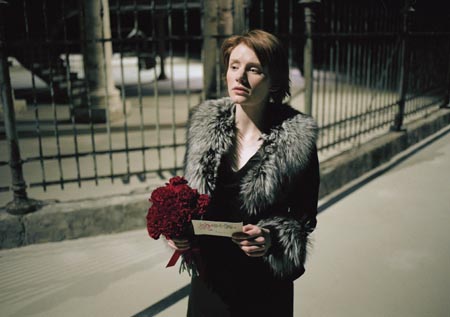|
Reviews of Recent Independent, Foreign, & Documentary Films in Theaters and DVD/Home Video
Directed & Written by: Lars von Trier. Produced by: Vibeke WindelÝv. Director of Photography: Anthony Dod Mantle. Edited by: Molly Malene Stensgaard. Music by: Joachim Holbek. Released by: IFC. Country of Origin: Denmark. 133 min. Rated: R. With: Bryce Dallas Howard, Isaach De Bankolť, Danny Glover, Willem Dafoe, Lauren Bacall, ChloŽ Sevigny, Udo Kier, MichaŽl Abiteboul & Jean-Marc Barr.
That said, Manderlay picks up where its older sibling left off. Grace, still less of a character and more of a walking philosophy on highly improbable stilts, has agreed to take part in her gangster fatherís illicit business. But even after setting fire to Dogville in her valiant attempt to spread democracy by any means necessary, Grace (now played by Bryce Dallas Howard) still believes she can turn the world on with her smile, using her newfound firearms and mob lawyers to right Americaís wrongs. After she spots a slave plantation still functioning 70 years since the Civil War and Reconstruction has come and gone, she feels itís her duty, as a white woman of power, to intervene. Oh, Grace. How many rape scenes do we have to sit through until you realize Pollyanna only worked because of Hayley Mills?
The second edition in von Trierís ďAmerica the BeautifulĒ trilogy continues its jumbled mass of philosophy, politics, and punditry. Like Dogville, the allegory is not a one-to-one reference; slavery is used primarily to discuss Americaís foreign policy, but also American mythology, sexuality, democracy, liberalism, racism, and, of course, as many philosophers as it takes to build a nation. Itís not an easy film to digest. And itís not an easy task getting past the out-and-out use of slavery as a metaphor to reach these issues - but it is profitable if you can.
It helps to lean toward the left - the farther the better - to enjoy von Trierís recent additions to his filmography, particularly
since Manderlay has a scope that reaches wider and more violently than its predecessor. The narrative is devalued in favor of symbolic
content, with subplots which feel more like 10-minute metaphors (including one intentionally hilarious and painful vignette where Grace quakes in shameful lust as her
ďtrembling cotton seedling of desireĒ grows for Timothy [Isaach De Bankolť], ďthe proud nigger"). Dogville seems peppy and straightforward in comparison.
As effective as Nicole Kidman was in Dogville, her replacement brings more to Grace, the poster-child of white guilt, than Kidmanís stone-faced portrayal ever could. And Howardís interactions with Willem Dafoe (as Graceís father, also recast) are more layered in sheer acting ability than their predecessors. The international celebrity-fest who played Dogvilleís townsfolk return as players in the Manderlay plantation, hinting at deeper symbolism and pushing the trilogyís connections to theatrical minimalism even further than its austere set suggests. Dogvilleís crew also returns, but this time allowing a more lush quality, seemingly playing down its staginess for a more accessible visual experience.
Zachary Jones
|
